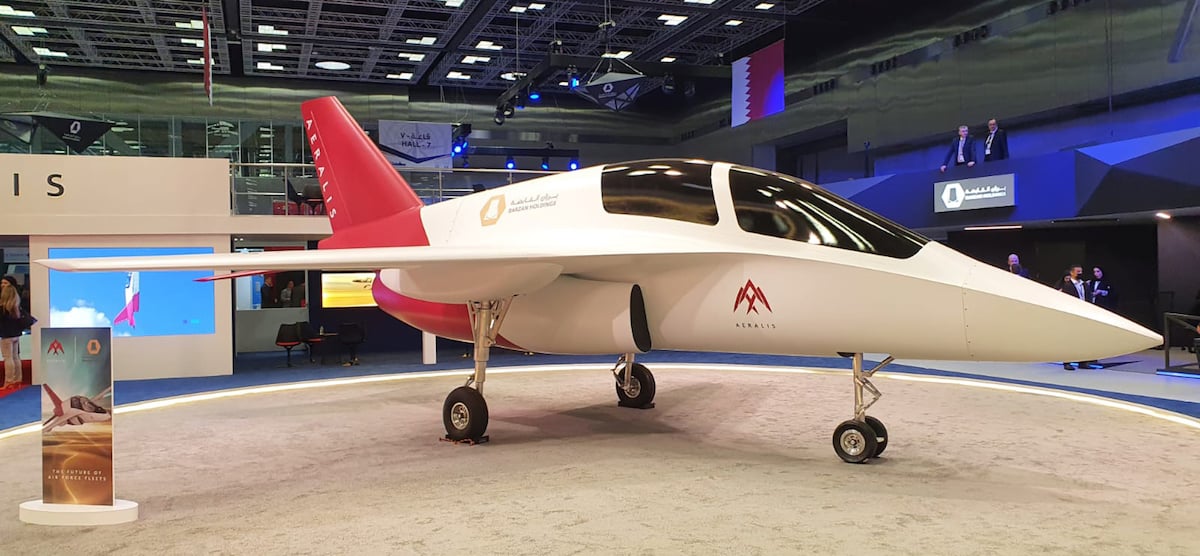Click Here to View This Page on Production Frontend
Click Here to Export Node Content
Click Here to View Printer-Friendly Version (Raw Backend)
Note: front-end display has links to styled print versions.
Content Node ID: 407829
British military jet developer Aeralis has made great strides over the past couple of years, having gained significant investment from Qatar-based Barzan Holdings as well as a contract from the UK Royal Air Force's Rapid Capabilities Office (RCO). The new funding has allowed the company to press on with the design of its innovative modular jet trainer aircraft. Originally developed as the Dart Jet in 2015, the aircraft uses a common core fuselage with replaceable wings, tail units, and powerplant pods to create different variants.
Aeralis partnered with engineering and design consultancy firm Atkins to work on the advanced jet trainer and the basic jet trainer variants of the aircraft in 2019, and since then the company has teased a range of other potential future variants, including uncrewed combat, air-to-air refueling, and ISR versions.
“We started in the training space for a very good reason, and that was really to focus on keeping the aircraft small for the training market, to control cost and complexity," Aeralis CEO Tristan Crawford told AIN. "But more and more customers say that even with that size of airplane, if you can reconfigure it and put a slightly different wing on it or choose a slightly different engine, I can use it to do so many other things and I get the cost efficiency. The requests we're having to look at are ISR, tanking, uncrewed—and obviously, we’re looking at weaponization as well, and the efficiencies just accrue and accrue and accrue. So for us, the potential is for this to grow into a true system of systems, an air system that generates even more affordability for the customer. That's really, really exciting for us.”
Last year Aeralis signed a three-year contract with the RCO for research and development into the company’s modular approach to the design and development of future aircraft, and to gain an understanding about how the Aeralis design might support UK Ministry of Defence (MoD) efforts to rationalize the future RAF fleet. The service has shown considerable interest in how the modular concept could fit into the family of adjuncts and effectors in development under the FCAS/Tempest program.
Aeralis signed a memorandum of understanding with Rolls-Royce in March 2021, launching an initial exploration of future propulsion requirements and options, though neither company has confirmed press reports that the prototype would fly under the power of a Rolls-Royce Adour turbofan. That powerplant is slimmer than some competing newer designs, such as the Honeywell/ITEK F124, with relatively modest fan module and casing diameter design constraints in the powerplant pod.
Also in March 2021, Aeralis signed a teaming agreement with Thales UK to further develop training and simulation systems, and in September 2021 Aeralis entered into agreements with Atkins and Siemens to collaborate on the company’s new Smart Integrated Digital Enterprise, known as Aerside.
After months of seeing only CGI renders of the design and occasional small-scale desk models, Aeralis displayed two life-sized, full-scale mockups of the aircraft at the DIMDEX exhibition in Qatar in March 2022. It showed one of them in a semi-disassembled state to demonstrate how the aircraft’s common-core fuselage can form the basis of a number of different aircraft variants. The other appeared in the advanced trainer configuration.
Since then, Aeralis announced a partnership agreement with Hamble Aerostructures in April 2022, which covers integrated manufacturing design support for the common core fuselage and canopy. The contract will support the development of the structural design to achieve the key preliminary design review milestone and should ensure that, by the time the aircraft enters full-scale production, the operation will be as streamlined and cost-effective as possible.
April 2022 also saw Aeralis sign the second phase of its program with the MoD, which plans to provide a route to exploit the potential of the ministry’s Pyramid open mission system architecture. “Over the last year we have delivered some exciting insights into the digital backbone required for the development of new military aircraft, and we look forward to continuing this important work in partnership with the RAF,” Crawford said.
In June 2022, Aeralis opened a new ‘Enterprise Hub,’ consisting of a hybridized office and design engineering space in the Aztec West business park on the northern edge of Bristol, close to several companies and entities with whom Aeralis has already established working relationships, including the MoD, Atkins, and Rolls-Royce. Bristol lies in the heartland of British aerospace and defense manufacturing, and enjoys excellent transport links, and a wealth of engineering and design expertise in the region.
The company reportedly aims to ready a demonstrator by 2025 and offer a saleable product by 2028.
